Fantasia 2019, Day 3, Part 1: Master Z: Ip Man Legacy
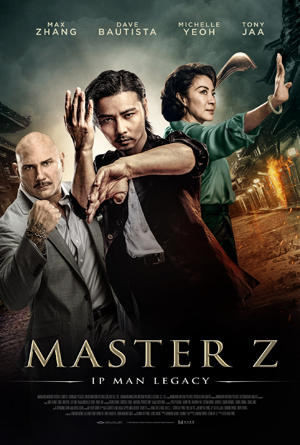 There’s a critical truism that all art is political. I would prefer to phrase it as “all art can be read politically,” because art has to be interpreted. And no work of art can be read only one way. Individual perspective and changing circumstances will give a work very different meanings, possibly including different political significance. (I once worked out my version of the truism as “all readings of art will depend in part on the reader’s historical and political situation,” which is why I’m not a sloganeer.)
There’s a critical truism that all art is political. I would prefer to phrase it as “all art can be read politically,” because art has to be interpreted. And no work of art can be read only one way. Individual perspective and changing circumstances will give a work very different meanings, possibly including different political significance. (I once worked out my version of the truism as “all readings of art will depend in part on the reader’s historical and political situation,” which is why I’m not a sloganeer.)
Consider Master Z: Ip Man Legacy (originally 葉問外傳:張天志, romanised as Yip Man ngoi zyun: Cheung Tin Chi). Directed by Yuen Woo-ping, it’s a spin-off from the three Ip Man films that starred Donnie Yen (a producer for this movie), which were loosely based on the life of the kung fu master who taught Bruce Lee. Master Z is the story of one of the masters Ip Man defeated in one of the earlier movies, Cheung Tin Chi (Zhang Jin, also credited as Max Zhang; I’m told this film’s title comes from an alternate way of romanising ‘Cheung’). When we meet him, in Hong Kong in 1961, he’s sunk so far as to have become a semi-principled gangland heavy. As the movie starts, he leaves this life for a more honest path. Complications ensue.
Most particularly, there’s Kit (Kevin Cheng), a hotheaded drug-peddling gangster with a withered arm, and Kit’s sister Kwan (Michelle Yeoh), who leads a crime syndicate she wants to make into an honest organisation despite the corrupt British rule in Hong Kong. After Cheung gets involved in a fight between Kit and a young woman named Julia (Liu Yan) — who’s sticking up for her friend and roommate, the opium addict Nana (Chrissie Chau) — he ends up working in the bar owned by Julia’s brother Fu (Naason), who’s engaged to Nana. Unfortunately, that part of town is where Kit wants to peddle drugs. And what part does restaurateur and community leader Owen Davidson (Dave Bautista) have to play in all this?
Put like that the film may sound complicated or soap-operatic, but in practice it’s all very clear and sets up a plot that’s engagingly complex yet relatively character-centred. The story’s a function of individuals with relatable motivations reacting against each other, and develops accordingly. Those motivations are big bright primary-colour emotions: love, love of power, and revenge. The different relationships among the characters provide complexities and shadings to these motivations, and the variety of strands in the plot are woven with dexterity. If occasionally characters drop out of the film for a time — most notably Cheung’s young son — we don’t notice.
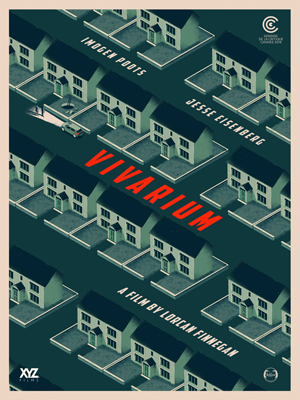 I’d skipped the first day of the 2019 Fantasia Festival since the only movie I wanted to watch, The Deeper You Dig, played the next afternoon. That gave me three movies on Day 2, and after seeing first an indie horror film made by three people and then an Australian comedy led by a major Hollywood star, I could only wonder what I’d get in the Irish-Danish-Belgian co-production called Vivarium.
I’d skipped the first day of the 2019 Fantasia Festival since the only movie I wanted to watch, The Deeper You Dig, played the next afternoon. That gave me three movies on Day 2, and after seeing first an indie horror film made by three people and then an Australian comedy led by a major Hollywood star, I could only wonder what I’d get in the Irish-Danish-Belgian co-production called Vivarium. 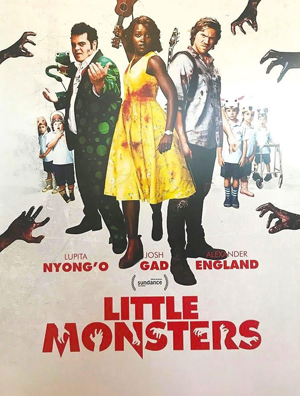 My second movie of Fantasia 2019 was in the 750-plus seat Hall Theatre. Little Monsters stars Lupita Nyong’o as a kindergarten teacher who takes her class on a field trip — only to get caught up in a zombie invasion. Written and directed by Abe Forsythe, it’s an occasionally tasteless but surprisingly effective horror-comedy.
My second movie of Fantasia 2019 was in the 750-plus seat Hall Theatre. Little Monsters stars Lupita Nyong’o as a kindergarten teacher who takes her class on a field trip — only to get caught up in a zombie invasion. Written and directed by Abe Forsythe, it’s an occasionally tasteless but surprisingly effective horror-comedy.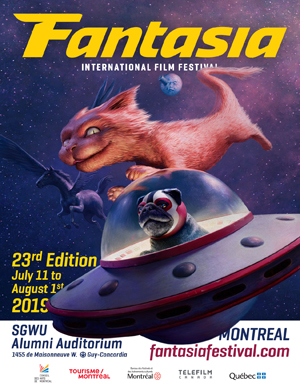 Not long ago I acquired copies of two well-known anthologies: Dangerous Visions and Again, Dangerous Visions.
Not long ago I acquired copies of two well-known anthologies: Dangerous Visions and Again, Dangerous Visions.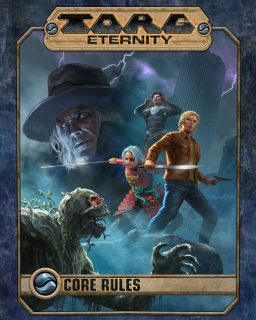 About a year ago I reviewed
About a year ago I reviewed 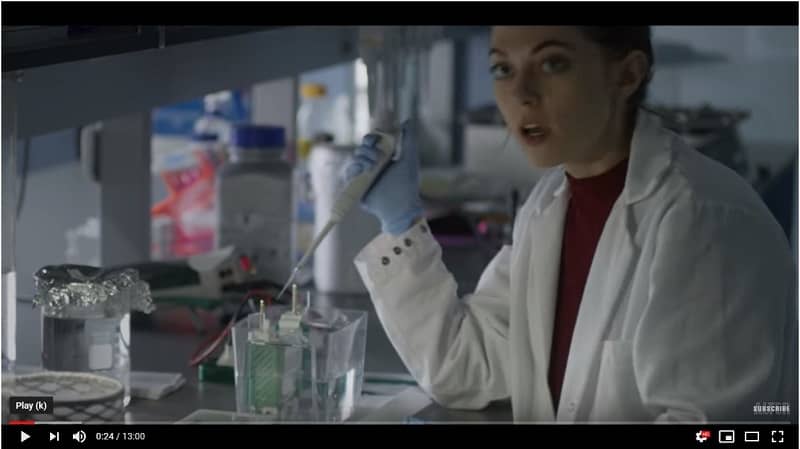
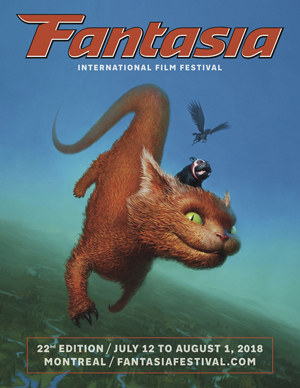 I saw 60 feature films or showcases of short films this year at the Fantasia International Film Festival. As is the case every year, seeing so many wild visions so close together was a powerful experience. If one film didn’t work, there’d be another one coming right after that’d be completely different. Having been slowed down by a bad cold the last few weeks, I’ve had time to think about what I took away from the Fantasia adventure this year in particular, and I keep coming back to things that struck me during the festival itself: the ability of the programmers to select films; the power of seeing the films as part of an audience and indeed part of a community; and the way those things interact.
I saw 60 feature films or showcases of short films this year at the Fantasia International Film Festival. As is the case every year, seeing so many wild visions so close together was a powerful experience. If one film didn’t work, there’d be another one coming right after that’d be completely different. Having been slowed down by a bad cold the last few weeks, I’ve had time to think about what I took away from the Fantasia adventure this year in particular, and I keep coming back to things that struck me during the festival itself: the ability of the programmers to select films; the power of seeing the films as part of an audience and indeed part of a community; and the way those things interact.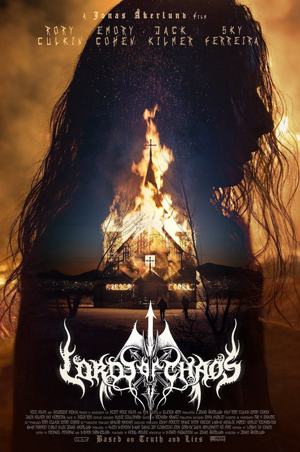 My last film of Fantasia 2018 was a late surprise. The Festival often starts with a screening slot still to be announced, as the Directors negotiate to add one last film to their line-up. This year, just a few days before Fantasia ended, they announced that they’d close this year’s festival with a screening of Lords of Chaos, a film by Jonas Åkerlund based on the true story of the band Mayhem in the early 1990s. It’s a drama, with a lot of very dark comedy, involving murder, suicide, and church burnings. The version of the film that played Fantasia was the same unrated version that premiered at the Sundance festival earlier this year; apparently cuts will have to be made before the movie can be shown again in a North American theatre. (I can’t say with absolute certainty what those cuts will be or what the reason for them is, but the leading theory I heard is that they have to do with the film’s realistic depiction of suicide.)
My last film of Fantasia 2018 was a late surprise. The Festival often starts with a screening slot still to be announced, as the Directors negotiate to add one last film to their line-up. This year, just a few days before Fantasia ended, they announced that they’d close this year’s festival with a screening of Lords of Chaos, a film by Jonas Åkerlund based on the true story of the band Mayhem in the early 1990s. It’s a drama, with a lot of very dark comedy, involving murder, suicide, and church burnings. The version of the film that played Fantasia was the same unrated version that premiered at the Sundance festival earlier this year; apparently cuts will have to be made before the movie can be shown again in a North American theatre. (I can’t say with absolute certainty what those cuts will be or what the reason for them is, but the leading theory I heard is that they have to do with the film’s realistic depiction of suicide.) 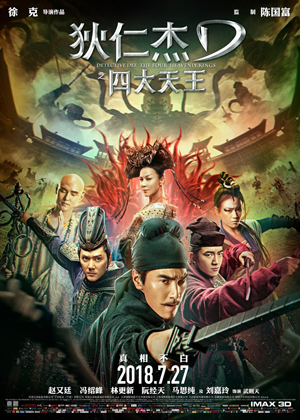 The two final movies I’d watch at the 2018 Fantasia International Film Festival were both in the big Hall Theatre. It’s perhaps appropriate that the first of those two aspired to be a crowd-pleasing blockbuster. Detective Dee: The Four Heavenly Kings (Di Renjie zhi Sidatianwang, 狄仁杰之四大天王) was directed by veteran Tsui Hark and written by Chang Chialu. It’s nominally a prequel to two other movies, though no knowledge of those films is required.
The two final movies I’d watch at the 2018 Fantasia International Film Festival were both in the big Hall Theatre. It’s perhaps appropriate that the first of those two aspired to be a crowd-pleasing blockbuster. Detective Dee: The Four Heavenly Kings (Di Renjie zhi Sidatianwang, 狄仁杰之四大天王) was directed by veteran Tsui Hark and written by Chang Chialu. It’s nominally a prequel to two other movies, though no knowledge of those films is required.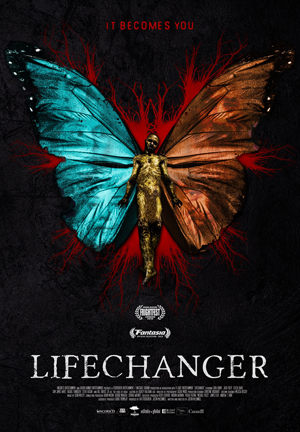 For my last movie of 2018 in the Fantasia screening room I selected a Canadian horror movie called Lifechanger. Written and directed by Justin McConnell, it follows an entity named Drew (narrated by Bill Oberst Jr), who, born human, at age 12 developed the ability and need to change bodies with other people (which Drew does repeatedly through the movie, tying the film together with voice-over ruminations; thus the “narrated by” in the previous parenthesis). The process kills the other person, and leaves Drew trapped in a swiftly decaying body. For decades, he’s had to keep changing bodies every few days, the inevitable rot slowed only slightly by doses of cocaine. Lately, though, he’s convinced himself he’s fallen in love with a woman named Julia. Drew wants to be close to her, but how can he do that given what he is?
For my last movie of 2018 in the Fantasia screening room I selected a Canadian horror movie called Lifechanger. Written and directed by Justin McConnell, it follows an entity named Drew (narrated by Bill Oberst Jr), who, born human, at age 12 developed the ability and need to change bodies with other people (which Drew does repeatedly through the movie, tying the film together with voice-over ruminations; thus the “narrated by” in the previous parenthesis). The process kills the other person, and leaves Drew trapped in a swiftly decaying body. For decades, he’s had to keep changing bodies every few days, the inevitable rot slowed only slightly by doses of cocaine. Lately, though, he’s convinced himself he’s fallen in love with a woman named Julia. Drew wants to be close to her, but how can he do that given what he is?